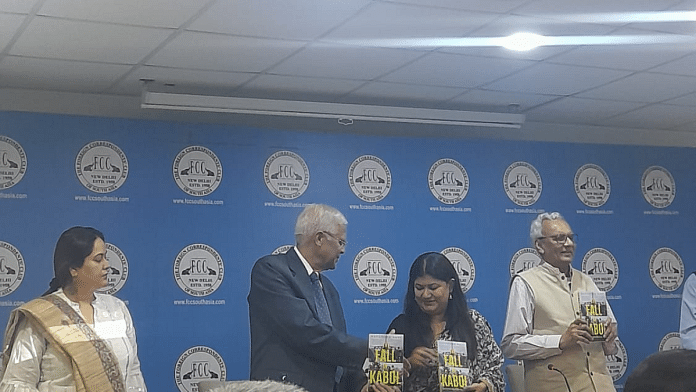New Delhi: A slight left from one of the busiest roads of New Delhi, right opposite the newly constructed Bharat Mandapam, takes you to a small yet buzzy Foreign Correspondents Club where journalist Nayanima Basu launched her book titled Fall of Kabul: Dispatches from Chaos. In this book, Basu, who previously worked with ThePrint, has tried to bust myths around Taliban 2.0, emphasising the importance of reporting from the ground in journalism.
Basu was one of the few South Asian journalists to be present in Afghanistan at the exact time when the Taliban took over the country from vacating United States forces in August 2021. The book tells her story.
Fall of Kabul narrates a female journalist’s experience covering a hostile war zone. From 8 to 17 August 2021, Basu travelled to several parts of Afghanistan and spoke to diplomacy and politics experts, Taliban leaders, embassy officials, and commoners.
It was all about looking for stories everywhere, the journalist-author said at the launch.
Basu also shared a few handpicked experiences from her two weeks in Afghanistan, giving the audience a sense of before and after. She also spoke about the various perceptions around the subject.
Jayant Prasad, former Indian ambassador to Afghanistan and panellist at Basu’s book launch, corroborated her claims and led the audience into discussing how the international community reacted in these two weeks and what India’s approach was.
Basu peppered the discussion with tidbits of a journalist’s trials while on assignment in a conflict zone. When she was leaving for Afghanistan from Delhi, the Indira Gandhi International Airport authorities could not fathom why someone would go to the troubled country at a time when even the US was withdrawing troops and the world was anxious about the Taliban’s comeback. After all, everyone expected the situation to worsen and get violent. When airport officials told her, “You’re not going to come back”, that the situation was too risky, Basu said: “That is my job.”
Other realities on the ground
Underling the importance of on-ground reporting, Basu cited the stark difference between the global perception of the Afghan situation and the reality on the ground.
“There was a stark difference between what the international community said and what the common man would say,” she said, stating that everyone (at a higher level) believed that there would be an arrangement and not a sudden usurping of power. Afghan commoners, however, knew that the Taliban was already at their doorstep. Some even supported the Islamist group.
About her approach to covering the conflict, Basu said it was important to “blend in”. That explains why, in the first picture of Basu shown at the launch, she is wearing a dupatta while interviewing Gulbuddin Hekmatyar or the “Butcher of Kabul”.
Audience’s two cents
Within the walls of the FCC room adorned with framed photos of various important events and people in the world, the audience at the book launch didn’t just listen but also contributed their two cents to the discussion. Journalists Kadambini Sharma of NDTV and Sanjay Kumar from Arab News and former diplomats, including Rajiv Bhatia, were in attendance.
“Gripping account,” applauded Jayant Prasad, co-panellist and former Indian Ambassador to Afghanistan, before sharing his insights on the Durand Line and India’s role as a neighbour.
The discussion moved on to the popular perception of Taliban 2.0. Prasad said the younger Taliban leaders are more tech-savvy and strategic but still ‘misogynistic’. Panellists also spoke about how Afghanis have “hopes from India” and consider the neighbouring country “their second home”, anticipating greater cooperation on visas, scholarships, and medical assistance between the two countries.
(Edited by Humra Laeeq)




Always a fan of Nayanima Basu.
Is there a YouTube video of the launch?